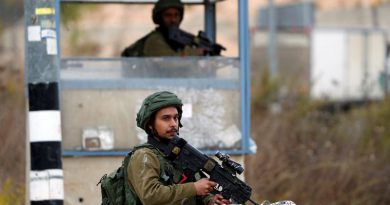Palestinian groups cancel mass Gaza rallies over coronavirus concerns
Gaza (Reuters) – Palestinian groups in Gaza cancelled mass rallies planned for next week along the border with Israel amid concerns about the spread of coronavirus in the densely-populated territory, organizers said on Saturday.
The rallies were called for March 30 to mark the second anniversary of the so-called “Great March of Return” which had prompted weekly protests by Palestinians seeking to regain access to land, now in Israel, from which their ancestors were forced to flee during the country’s creation in 1948.
“We call upon our people not to go to the Return encampments on March 30 and to stay home in order to maintain the safety of our people in the face of this lethal pandemic,” said Khaled al-Batsh, a senior member of the Islamic Jihad militant group.
Instead, Batsh called upon Gazans to mark the day by raising Palestinian flags on their rooftops and burning Israeli ones.
According to Gaza medical officials, 215 Palestinians have been killed by Israeli soldiers firing from the other side of the border during the protests, with another 8,000 suffering gunshot wounds. In the past few months, the weekly protests have been smaller.
One Israeli soldier was killed by a Palestinian sniper during the demonstrations. Israel said the protests were often used as cover for militants trying to breach the border and that many protesters had hurled rocks and explosives at its troops.
In 2019 U.N. Human Rights Council investigators said Israeli forces may have committed war crimes and crimes against humanity, with children and paramedics among the fatalities.
So far, nine out of the 97 coronavirus cases confirmed in the Palestinian territories have been confirmed in the Gaza Strip.
Gaza’s hospitals, which were overwhelmed during the protests by gunshot wounds and amputations, are now gearing up for the challenge of containing the coronavirus in the coastal enclave of two million Palestinians, many living in refugee camps.



